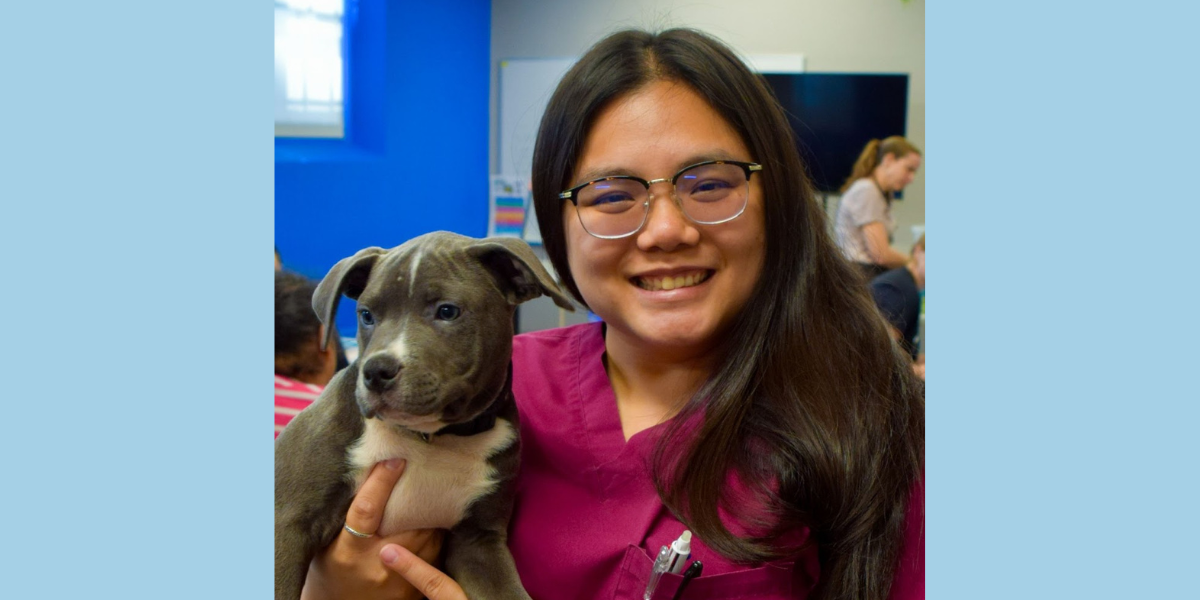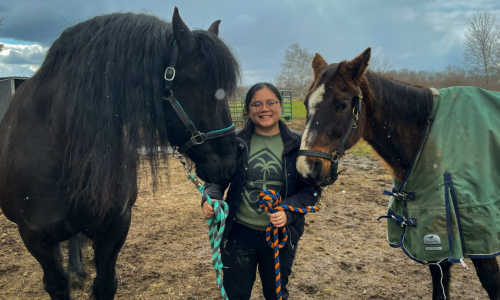A champion for change
DVM student Esther Lam recognized nationally for commitment to accessible care, animal welfare in Minnesota and abroad

DVM student Esther Lam recognized nationally for commitment to accessible care, animal welfare in Minnesota and abroad
DVM student Esther Lam holds a puppy patient.
Esther Lam, a third-year DVM student at the College of Veterinary Medicine (CVM), strives tirelessly to improve the lives of people and pets in underserved communities. During her childhood in Guam, she experienced firsthand the pain of watching pets suffer because the cost of veterinary care was out of reach.
“We had a dog that had severe mange and ear infections, but we just could not afford to pay for care.” Lam says. “Watching the poor dog dealing with very treatable diseases was hard, especially when he eventually developed pretty bad infections.”

Unable to provide the dog with veterinary care relief, they contacted animal control as a last resort and surrendered the animal. Lam assumes they euthanized the dog. Crying for days afterward, Lam felt incredible guilt that she and her parents could not do more for their beloved dog.
Losing a pet unnecessarily and witnessing so many others struggle to receive veterinary services for pets in need motivated Lam to support initiatives improving access to veterinary care. These efforts recently earned Lam a $10,000 Compassionate Care scholarship awarded by the Humane Society Veterinary Medical Association (HSVMA). Awardees must demonstrate a commitment to animal rights, inclusivity in veterinary medicine, and equitable access to care.
Lam’s educational path and training demonstrate her steadfast commitment to improving animal welfare and access to veterinary care. Currently enrolled in the DVM/Master of Public Health degree program, she also holds a master’s in animals and public policy. She now spends most of her days working to better the lives of animals.
“I have not forgotten my past,” Lam says. “I will always advocate for promoting and seeking avenues to make veterinary medicine and care even more easily accessible through volunteering, educating, and learning about factors impacting accessibility.”
Joining the effort to expand access to care, Lam participates in two student-led groups targeting underserved and marginalized communities. The Student Initiative for Reservation Veterinary Services (SIRVS) and the Veterinary Treatment Outreach for Urban Community Health (VeTouch) are making a difference for people and places with limited resource access.
“Her future is bright,” according to Dr. Raye Taylor, ’11 DVM, Lam’s mentor and senior veterinary medical officer for Rural Community Animal CARE. “Esther’s official roles and countless volunteer hours with these organizations show her deep commitment to providing access to care, embodying spectrum of care, cultural humility, and servant-leadership.”

Lam serves as the SIRVS Community Animal Caregiver liaison. Visiting tribal communities in Minnesota, she’s worked with several indigenous veterinary students and the local community to create and disseminate culturally appropriate educational videos focused on animal care. Now in the production phase, the videos strive for a culturally inclusive point of view and to avoid claiming “the right way” to care for animals. Instead, they seek to provide information communities can combine with traditional knowledge to develop local best practices.
VeTtouch, the other student-led CVM group Lam joined, also gives her firsthand experience in human-animal relationships in underserved populations. Increasing access to care and supporting underserved people and their pets, the community clinic provides no-cost care by students under the guidance of veterinary instructors and staff from the basement of a community church in Minneapolis.
Lam’s participation in both groups builds upon her earlier work to use policy changes to support the human-animal bond and improve animal welfare. While completing her master’s degree
in animals and public policy, with guidance from a senior policy analyst, she co-authored a bill while serving as a junior policy analyst in the Office of Guam Senator Sabina Perez. Formally credited to Perez, Lam drafted the bill based on research and interviews with constituents.
The bill changed animal cruelty laws in Guam. Titled the “Protecting Animal Welfare and Safety Act,” the bill reached Congress in December 2020 before becoming law in January 2021. Lam’s efforts helped put Guam at the top of the list of top-ranked US territories with robust animal protection laws.

Upon graduation, Lam hopes to pursue emergency medicine with an eye toward underserved populations and improved access. She aspires to return to her home island of Guam to provide care where it is not currently readily found but in high demand. She also hopes to act as a resource for the community by serving in a role as a public health officer role. “In that role, explains Esther, “I will be able to learn from a wide variety of communities with many different cultural backgrounds so that I can continue on with my future career with even more understanding of others.”
Giving a nod toward Lam’s “humility, maturity, and advanced grasp of community-level systems,” Dr. Whitney Waldsmith, a community medicine expert and another of Lam’s mentors, sees big things ahead for Lam. She strongly believes that Esther will become “a veterinarian that can make change across financial, geographic, and cultural boundaries."